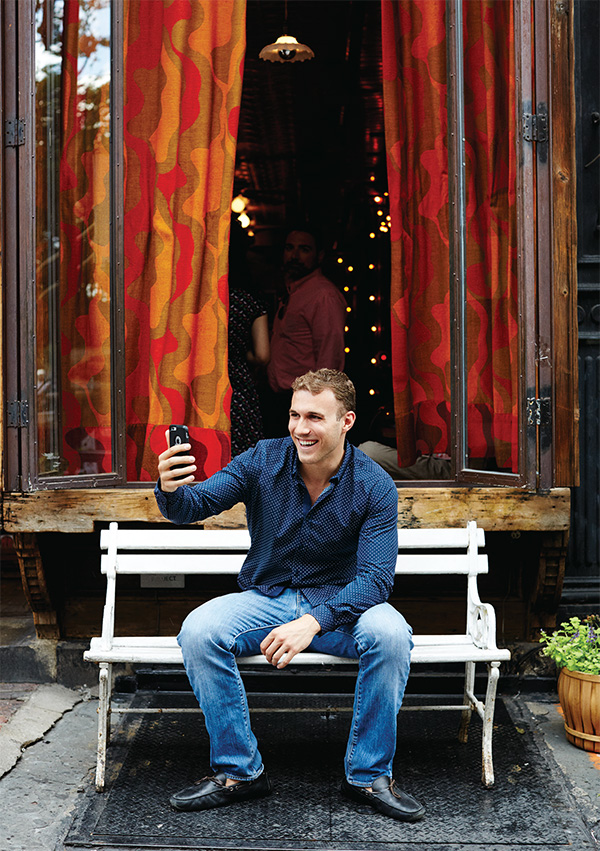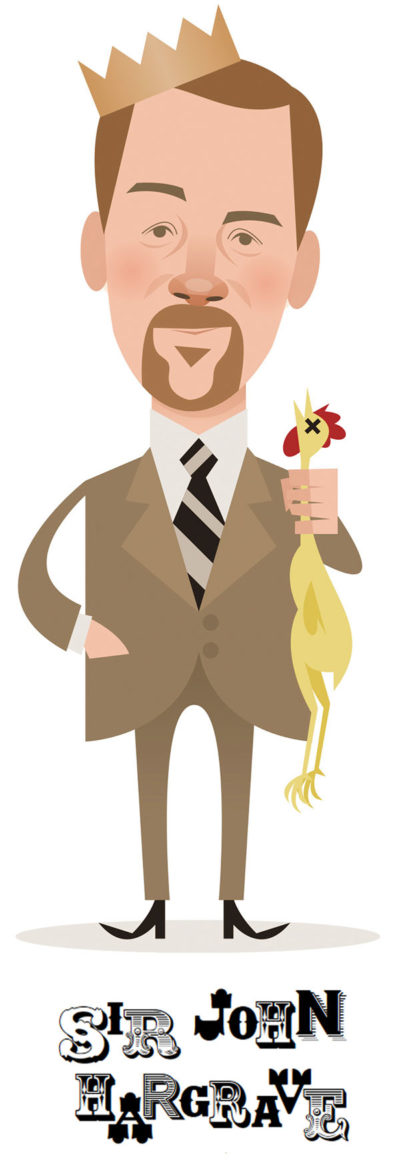
Illustration: Scott Garrett
“This is about people who want to come together and be goofy,” says Kai Haskins ’18. Frankly, he believes some goofiness is needed. “People are so focused. They take everything so seriously,” Haskins says. “I think it’s important to take a moment and be foolish.”
A group of friends formed the ensemble, its name a nod to Roger Babson’s obsession with gravity, in spring 2016. Since then, they have performed regular shows at Roger’s Pub & Grille. “We’re going to hang out and be funny no matter what,” says Katherine Will ’18. “We might as well entertain people at the same time.”
Catch one of the group’s shows, and you’ll see comedy created and performed in the moment without the aid of a script. As audience members shout out suggestions, the improvisers may pretend to be Dating Game contestants, or perform a fake movie, or run through a skit called Weekend at Bernie’s, in which cast members die off one by one, until only one person is left to portray all the roles.
These out-on-a-limb performances take courage. Mistakes are routine. “All of us have made jokes that don’t land,” Haskins says. “You have to power through it. If you mess up, just wait 45 seconds for someone else to mess up.” A favorite quote of Max Mendelsohn ’18 is playwright Samuel Beckett’s famous ode to failure: “Ever tried. Ever failed. No matter. Try again. Fail again. Fail better.” It makes a fitting battle cry for improvisation.
For Mendelsohn, improv serves as a crucial break in his day-to-day routine. “It’s a stress reliever,” he says. “I need the escape.” When done right, improv forces performers to be present. There is no time for doubt, discussion, or hesitation on stage. If performers have an idea during a scene, they shouldn’t mull it over. “Just throw it out there,” Mendelsohn says. “Don’t think about it.”
Students Against Gravity is sponsored by The Empty Space Theater, a Babson theater group, and its faculty advisor is Sandra Graham, associate professor of ethnomusicology. Graham hopes the dozen or so student improvisers in the troupe will continue to develop as performers. This semester, Larry Coen, a Boston improv comedian and actor, will run the group’s rehearsals. “I would like to see Students Against Gravity grow into a troupe of performers who know and trust each other completely, so that they take ever greater risks,” says Graham.
While performing improv has the added bonus of sharpening many critical business skills, such as adaptability, communications, and creativity, students find great joy in one skill in particular: making people laugh. To face a room full of strangers, who are staring at you and waiting in anticipation, and make them burst into laughter is an amazing experience. “It’s a top-of-the-world feeling,” Mendelsohn says.—JC
]]>Jacques needs the items for a little bit of trickery. Taking a hundred-dollar bill, he makes it levitate in midair. The bill floats between his hands, mocking gravity. “It took me four or five years to learn how to do that,” he says.
With the lighter fluid, he douses the inside of a wallet. Out on the street he opens it, revealing flames that shoot into the air. Jacques seems calm as he holds the wallet, as if it were a cup of coffee and not a handful of fire growing ever higher. “I almost lit my shirt on fire,” he says.
No hocus-pocus is involved with the last item, the coconut water. Jacques simply drinks it. He’s thirsty.
Jacques (pronounced “Jakes”) is a magician. Hang around him long enough, and something astounding and unusual is bound to happen. From the age of 10 through his years at Babson, he worked as a professional, at his peak performing 250 magic shows a year. He later gained popularity on the live-streaming app Periscope, performing tricks for his nearly 100,000 followers, and doing work for The Ellen DeGeneres Show.
Such recognition led Jacques to start his own business, Applause, last September. The company connects other Internet personalities like himself with brands eager to capitalize on the immediacy of live streaming. “Live streaming is blowing up right now,” says the 24-year-old. “A lot of brands are trying to figure it out.” Jacques’ decision to become an entrepreneur has taken the magician’s life onto a bigger and headier stage. He has hung out on red carpets and at exclusive events, gone on a promotional tour for the movie Creed with stars Sylvester Stallone and Michael B. Jordan, and met Mad Men’s John Slattery at a party. (“I showed him some magic and freaked him out one night.”) On one surreal day, he helped with a live promotional broadcast involving tightrope walker Nik Wallenda, who walked on a wire above the streets of New York while Mr. T, still sporting the mohawk and chains of his ’80s splendor, barked encouragement up at him.
“It’s been the craziest year of my life by far,” Jacques says. “You couldn’t plan this.”
Red Carpets and Angry Birds
Jacques calls Manhattan home, at least for the time being. He lives in a fourth-floor walk-up in the borough’s East Village neighborhood, and it’s a typical New York apartment: cozy and small. He has a roommate who works in finance, but he’s usually out, the only sign of him being his messy room and the miniature basketball hoop he mounted on the wall. Jacques has stuck a white board to the wall, and he has filled it with things to do: “reply to urgent emails,” “credit card,” “buy books,” and “set goals,” which has a star next to it. “You have to refresh your goals all the time,” he says. “You have to keep organized.”
Applause keeps Jacques busy, with clients including Marriott, Bose, Warner Bros., Kate Spade New York, and the Jamaica Tourist Board. His startup taps into a unique 21st century phenomenon: internet celebrities. Granted, these personalities aren’t as well-known as movie stars or rock stars, but they can still inspire fanaticism in their fans. “The average American doesn’t know who they are, but those who do love them,” Jacques says.
Brands are eager to use these web stars to influence consumers, and this is where Applause—with its network of comedians, musicians, travel bloggers, auto and fashion experts, and others who have found internet fame—comes in. Say someone is popular on Periscope for her do-it-yourself makeup tutorials. Applause might try to connect her with Revlon, which could pay her to do one of those tutorials using its lipstick. Or maybe someone is known for his YouTube cooking videos. Applause might hook up the cook with Perdue, and he could make a recipe with its chicken. Or say someone has a large online following for mixing up cocktails. Applause could connect him with Grey Goose, and he could create a cocktail using its vodka. “This is the modern-day celebrity endorsement,” Jacques says.

Photo: Winnie Au
From his apartment’s fire escape, Jon Jacques looks out on 6th Street in Manhattan’s East Village neighborhood.
The campaigns that Applause organizes are done via the growing trend of live streaming. While many companies make taped videos for their brands, they don’t have much experience going live, when a second take isn’t an option. “Going live presents all kinds of interesting challenges,” Jacques says. “The talent must be able to think on their feet.” As someone who has performed for audiences since he was a kid, Jacques is well-suited for live streaming. He first hopped on Periscope, which is owned by Twitter, shortly after its launch in spring 2015. Other social media companies also offer streaming, notably Facebook, which began rolling out its streaming platform, Facebook Live, last year. Jacques sees Facebook Live as a big opportunity, and most of Applause’s streaming campaigns are done on the platform. “Facebook’s 1.6 billion monthly active users is no joke,” he says. “The scale is huge.”
Applause has taken Jacques to some interesting places. He attended the movie premiere of Angry Birds, an event that featured the usual trappings of celebrity—red carpet, security guards, photographers, fans—but also a DJ booth, piglets, and exotic birds. “It was crazy,” he says. “The studio wanted to capture people’s attention.” Applause had hired Rosanna Pansino to live stream from the event because Jacques thought that the pastry chef, who is popular on YouTube for her Nerdy Nummies series, would make a good fit. (On YouTube, a video of her making Angry Birds cupcakes had garnered 21 million views.)
Jacques himself was hired to live stream from another red-carpet premiere, interviewing the cast of In the Heart of the Sea, starring Chris Hemsworth. Then there was the six-city tour he did to promote the Rocky sequel, Creed. At each stop, Jacques performed a magic trick while the cast visited local Big Brothers Big Sisters chapters. “I loved every minute of it,” Jacques says. “I was jumping out of bed every morning.” He got to know one of the movie’s stars, Michael B. Jordan, a bit during the tour. Impressed by Jacques’ magic, Jordan told him, “You probably get all the girls.”
Don’t Forget the Magic
Applause may be doing well, allowing Jacques to rub shoulders with Hollywood, but it also has upended his life in the all-consuming way that startups do. Like many an entrepreneur, he was sleeping less and less. Four hours of shut-eye a night became typical. “You know that it’s not sustainable,” he says. “It starts to take a toll.” With his to-do list constantly flashing in his mind, Jacques rushed through days so busy that evenings rolled around and he would have the startling realization that he hadn’t eaten all day. His hectic days also kept him from performing magic on the web as much as he would have liked.
To bring more balance to his life, Jacques now wakes up and does a 10-minute meditation with an app called Calm. Then, before opening his email, he drinks coffee, eats oatmeal, and hits the gym. “You can’t be all business,” he says. “You have to be well-rounded.” He also is making time to live stream more magic. It’s still something he enjoys, the thrill of putting himself out there to the thousands who may be watching, and it’s also good for business. Jacques serves as the face of Applause, so as he builds his company, he wants to continue building his brand as a web personality known for live streaming magic. Seeing so much of Applause’s business receiving play on Facebook Live, he’s eager to use it more himself. “If I can do 100,000 on Periscope, an app many people have never heard of, what can I do on Facebook?” he says.
With his schedule relatively free on a recent Tuesday afternoon, Jacques decided it was a good day for magic. Normally, he would be running all over the city from one meeting to another with ad agencies, so he’s happy for the respite. From his bedside table, he pulls out a clear plastic bag full of playing cards, a good 10 decks in all. He goes through them, trying to find ones that aren’t too dog-eared. Then he pulls out another bag from the bedside table, a seeming repository for magic and mystery. This bag contains various props. “I’m trying to figure out what we can do here,” he says, and pores over instructions written on a folded piece of paper, like a wizard going over a spell book. Finally he announces, “Cool.” He’s ready.

Photo: Winnie Au
Jon Jacques’ parents inspired him. “Find what you love to do,” they told him growing up, “and the rest will follow.”
Magic has been a constant in Jacques’ life since the age of 6, when he was given a magic kit. That unexpected gift went off like a thunderbolt in his young life. “At 6, I would run around the house, doing tricks for anyone who would watch,” he says. Four years later, he began performing professionally, doing tricks at birthday parties, working his way up to events at parks and recreation departments and ultimately at corporations and trade shows. At the age of 15, he performed in front of 8,000 people at the Mohegan Sun casino during halftime of a basketball game.
Through the years, Jacques learned the ins and outs of being a magician. Practice is essential. The words you say must come naturally, and your hands must move by muscle memory. “You have to have confidence,” he says. “If you forget the words, or your hands start to tremble, the trick doesn’t come off.” As important, if you make a mistake, just keep going. Don’t acknowledge it, unless you have no choice. When he was 15, Jacques used a live dove for a trick at a birthday party. “The dove took off, flew around the room, and landed in the kid’s birthday cake,” he says. “No matter what you do, they know that wasn’t supposed to happen.”
While at Babson, Jacques would perform four to eight magic shows a weekend, and on campus he became known as the go-to guy for presentations. “Whenever we did a rocket pitch, people were like, ‘Jon, go,’” he says. For a class presentation about Anheuser-Busch, he took a piece of paper, lit it on fire, and made a can of Budweiser appear. “Right off the bat, I had their attention.” Jacques lived in E-Tower, which proved beneficial in a number of ways. When starting Applause, he reached out to tower alumni for help connecting to investors. “The response was amazing,” he says. “They introduced me to some of the biggest investors in Silicon Valley.”
He also met Alex Debelov ’10 at the tower, and one night Jacques helped him until the wee hours with his presentation for a business plan competition, which Debelov ended up winning. Debelov went on to found Virool, a video-distribution platform based in San Francisco, and he didn’t forget Jacques. One afternoon after graduation, Jacques got a call. “You want to come out to San Francisco to see what we’re building?” Debelov asked him. Jacques said yes and took a sales position. After thousands of magic shows, he was ready to try something new.
Not that he was done doing tricks while at Virool. One thing Jacques loves about magic is its power to break down barriers between people. “It gives you the ability to walk into a room of complete strangers and walk out with a bunch of friends,” he says. “It gets people to open up.” So at business meetings, Jacques has pulled out magic from time to time. “I walk in and shock them and surprise them,” he says. “When they file out, they are laughing and smiling.” Word of his antics has gotten around. He once did magic during a meeting with a Los Angeles ad agency, and months later returned for another meeting but with different people. “You mind if I show you something?” he asked the room as he began an illusion, at which point someone said, “You’re that guy. We’ve heard about you.”
Jacques had a successful two-year run at Virool, becoming its number one salesperson, but when Periscope was released last year, he saw its potential. He decided to quit Virool and regularly live stream on the new app. He would have no steady income, but he wanted to see where live streaming could take him. “Was I a little nervous? Sure. I didn’t know how it would go,” he says, but adds, “You learn to trust in yourself, that you’ll find your way.” Kenn Miller, who worked with Jacques at Virool, remembers his friend telling him of his plans. “Jon is not afraid to go with his gut,” Miller says. “Even though he was entering into an uncertain playing field, you could tell by his voice that he had to follow his passion.”
Jacques broadcasted on Periscope four times daily. That meant performing a lot of magic, so he spent several hours a day studying new tricks. “Having to learn a ton of magic is hard,” he says. “An effect may take a week to learn.” The hard work was worth it. He quickly gained loads of followers, and brands saw his success and began contacting him, wanting to tap his expertise in live streaming. Jacques soon knew the time was right for his startup.

Photo: Winnie Au
Jon Jacques grew popular on Periscope for his magic performances. His company, Applause, connects web personalities like himself with brands eager to capitalize on the immediacy of live streaming.
The Effect Can Ripple
While entrepreneurship and magic are two main passions in Jacques’ life, he actually has one more that runs deep: altruism. When he performs magic, Jacques likes to give back in some way. A performance can simply be about you, he says, or it can be about more than that. “You can make all the money in the world, but if you’re not positively impacting people, what’s the point?” he says.
Even as a teenager, he often performed free magic shows for charities. One show in particular stands out from those days, when he performed at a little girl’s backyard birthday party. When her dad hired him, he informed Jacques that his wife was dying of cancer. “I was like 16,” Jacques says. “This was probably their last time celebrating together as a family, and they wanted me. It was an honor.” He gave the show everything he had, and when he finished there was a huge round of applause. Later, when the father went to pay him, Jacques said the show was on the house. “He just broke down in tears. He gave me a hug.” Of the many shows Jacques has performed, it remains one of the most memorable. “It was heavy,” he says. “That memory stayed with me. I’m tearing up now.”
When he began live streaming on Periscope, Jacques did a broadcast from Times Square. He made a sign saying “100 Percent of Proceeds Will Be Donated” and brought along a laundry basket where people watching in person could drop money. “It was my biggest broadcast to date,” he says. From then on, collecting donations became a regular part of his act, and he set up a GoFundMe page so people watching online could donate as well.
Jacques then set out to personally give the money to people in need. In one typical example, he visited a cancer patient at a hospital, performed some magic for her, and presented her with money for her bills. The presentation of the money always was done on camera so his followers could see where the donations were going and perhaps be inspired. Too often, Jacques believes, people are focused on their phones and the hassles of their own lives. Maybe those broadcasts helped people look beyond themselves. “Maybe they’ll look at the world a little differently,” he says. “The effect can ripple.”
Those who know Jacques say this need to help and give back is a big part of who he is. “He truly cares,” says Dan Ragan, Jacques’ COO at Applause. “That’s what makes Jon stand apart from most people.” Friend and former Virool co-worker Miller agrees, saying, “I’ve never seen a person so open and willing to help because I think he truly, and I mean truly as in it’s core to his personality, cares.” Jacques’ efforts caught the attention of The Ellen DeGeneres Show, which hired him to do a series of videos, called Magic Moments, for the program’s website last year. Jacques would approach people in need (a man who opened an animal shelter that was struggling, a former homeless man who wanted to become a personal trainer and needed money for the exam) and surprise them with a magic trick and a check.
Jacques eventually would love to do more work for DeGeneres’ show. He pledges to continue giving back in some way. “It’s always something that will be part of my life,” he says.

Photos: Winnie Au
Live streaming is a growing trend, and Jon Jacques’ company is poised to take advantage of it.
A Move to LA
As he looks to the future, Jacques wonders about competitors that may pop up and follow the lead of Applause, which jumped on the live-streaming trend so early. He also expresses hope that Applause may one day be acquired by a bigger company, such as Twitter or AOL.
For now, Applause is a lean operation, with only three full-time staff besides Jacques, plus a few consultants. The company had an office in New York but recently decided to close it. Paying high rent for such a small operation wasn’t necessary, says Jacques, who simply works from his kitchen table.
In the immediate future, Jacques is dealing with an impending move out West. He had lived in California for a while before when he started at Virool, and now he’s returning, this time to LA. Much talent lives out there, so he’s hoping to make valuable connections, though the move caused some uncertainty at first. How many months would he be out there? Where would he live? What about his current apartment lease? Jacques wasn’t sure. Then there was the matter of his girlfriend. They’ve been dating for two years, but she lives in San Francisco and had been in the process of moving to New York to be with him.
Ultimately, everything worked out. (Jacques will be in LA for two or three months, and he and his girlfriend will move back to New York around the same time.) Not that the uncertainty worried him. “Change is good,” he says. “You can’t be afraid of it.” Many people seek routine in their lives. Not Jacques. “I think it’s boring,” he says. Indeed, Jacques thrives under pressure, whether in business or live performance. “He is always calm and collected,” says Miller. “In fact, I think it’s pressure that causes him to sharpen his focus, which brings out the best in him.”
After going through the bags of cards and props in his apartment, Jacques is ready for some magic. He likes to interact with strangers while doing tricks, so he heads to Washington Square Park. “I’ll just walk around and mess with people,” he says. Jacques admits that going up to strangers can be challenging. “It’s all in the approach,” he says. “You walk up smiling and confident. You know you have something special to show them.”
Jacques pulls out his smartphone and begins live streaming on Periscope. “And we’re live,” he says, turning the phone to show viewers the park with its fountain and iconic arch. Approaching some French tourists, he says, “I’m a professional magician here in New York. I was wondering if you wanted to see some magic.” Pulling out a deck of cards, he invites them into a world of mystery with three simple words: take a card.
In the park, Jacques is in his element, performing magic, thinking on his feet, broadcasting to the world. “I do it for the rush,” he says. “I’m having a blast.”
]]>Spend time with Hargrave, though, and you may feel a bit anxious, wondering if a whoopee cushion waits on your seat or if a bucket of water is about to pour on your head.
Hargrave is a professional prankster. Born fittingly on April Fools’ Day, he has written two books on pranks and made a career out of stunts and tomfoolery. Ranging from the sublime to the silly, his pranks have landed him on the front pages of newspapers, and they have landed him in jail. He has shouted, “Can you hear me now?” into a megaphone outside the house of Verizon’s CEO. He has called a Chinese restaurant to complain about the fortune in a fortune cookie. He has covered an unsuspecting woman’s cubicle in hundreds of waffles. He has chased an accomplice dressed as Twitter’s bird mascot through a conference hall as the CEO of Twitter was set to speak. He even has changed his name legally, adding a “sir” to poke fun at the stodginess of the royal family.
Hargrave insists this mischief is all in good fun. “At the end of the day, everyone should be laughing, including the person who was pranked,” says Hargrave, CEO and founder of Media Shower, a Sherborn, Mass., company that creates offbeat and humorous content for websites. “Pranks are a way of waking everyone up. We as a society have a need for pranks. They make us look at an ordinary situation in a different way.”
Good pranks also should be funny. Check out Hargrave’s antics, and you’ll laugh a lot, which is a credit to the prankster. Making people laugh is a hard business, and it doesn’t always pay the bills. But being funny has power, whether one is pulling pranks, making videos, or telling jokes on stage. Humor can sell a product, humble the mighty, make you think, and lighten your load, at least for a little while.
Diet Cokes and a Dirty Secret
How hard is being funny? Consider standup comedy. Many people are funny in their everyday lives with friends, says Brian Casey ’77, but climbing on stage and entertaining strangers is a whole other matter.
 Casey performs stand-up from time to time, whenever he’s feeling the itch. He admits he’s “not good enough” to make it a career, but he has performed in a number of clubs, including the famed Gotham Comedy Club in New York City. “It was a thrill,” he says. Casey started performing when a friend talked him into taking a stand-up comedy class together at the Boston Center for Adult Education. The friend chickened out at the last minute, but Casey went ahead anyway and soon was hooked.
Casey performs stand-up from time to time, whenever he’s feeling the itch. He admits he’s “not good enough” to make it a career, but he has performed in a number of clubs, including the famed Gotham Comedy Club in New York City. “It was a thrill,” he says. Casey started performing when a friend talked him into taking a stand-up comedy class together at the Boston Center for Adult Education. The friend chickened out at the last minute, but Casey went ahead anyway and soon was hooked.
For the comedians who aren’t headliners, a typical slot at a club may be seven minutes, Casey says. That might not sound like much, but those seven minutes need to be tight, smart, and well-rehearsed. “Everything is calculated,” says Casey, who when not on stage is the marketing manager at SmartDrive Systems, a San Diego company that makes software to help vehicle fleets reduce carbon emissions and save fuel. “You work on jokes a long time. You do it in your head constantly.”
Casey’s material leans toward observational humor, and he keeps a recorder in his car so he can take down joke ideas when they strike him. “You write a whole bunch of stuff; you throw away a bunch of stuff,” he says. When crafting his set, he mulls over which individual words to use. “What’s funnier,” he’ll think, “big, large, or enormous?” Even throwaway comments, a “huh” or “yeah,” are in the set on purpose to give emphasis or a pause. Nothing is improvised, even if it seems that way. “The dirty secret of stand-up comedy is it’s all about memorization,” Casey says.
Once his set is ready and Casey—fueled by lots of Diet Cokes—climbs onstage, one of the biggest challenges he faces is distracted audiences. Casey often plays open mic nights, when the club is filled with jittery amateur comedians too busy fretting and reading their notes to laugh at his jokes. “There is a little pool of nervousness,” he says. To grab people’s attention, he’ll sometimes walk into the audience and poke fun at folks (“You can do better,” he’ll say to one of a couple.).
No matter how hard he has worked on a set, there’s no guarantee it’ll set off gut-busting belly laughs. “Everybody bombs on stage on a regular basis,” he says. “You expect it to happen.” Inexplicably, the same material that went well one week may land with a thud the next. For those moments, Casey can only shake it off and hop on stage again. “There’s always tomorrow night,” he says.
And the next night can be magic. Casey may connect with the audience, laughs may come easy and often, and he’ll think to himself, “This is the way life should be.”
And the Savings Ran Out
Stand-up’s challenges don’t end with the grind of creating sets and the fickleness of scoring laughs. Comedians also must find stage time, an audience, and someone who will actually pay them.
 Babson’s Lakshmi Balachandra knows about these frustrations all too well. The assistant professor of entrepreneurship has experienced a wide-ranging career, one with twists and turns that sent her bouncing between coasts, jobs, and passions. Her resume includes stints launching a toy store, working in venture capital, and teaching in academia. For many years, she also pursued something daring and different, not to mention difficult.
Babson’s Lakshmi Balachandra knows about these frustrations all too well. The assistant professor of entrepreneurship has experienced a wide-ranging career, one with twists and turns that sent her bouncing between coasts, jobs, and passions. Her resume includes stints launching a toy store, working in venture capital, and teaching in academia. For many years, she also pursued something daring and different, not to mention difficult.
Having grown up watching and adoring Saturday Night Live, Balachandra always had an interest in trying her hand at comedy. While working at a toy store in San Diego after college, she took lessons in improvisational comedy and joined an improv troupe. Working without a script and following the shouted-out suggestions from audiences, she learned to build scenes and flesh out characters, to listen intently to her fellow performers, and to focus. “You have to be in the moment,” she says. “It’s incredibly terrifying.”
But it also proved exhilarating. Tiring of the toy store, Balachandra returned to the Boston area, where she grew up, and went to work in venture capital. While she couldn’t find the right improv group to join, she continued in comedy by taking a stand-up comedy class, just as Casey did, at the Boston Center for Adult Education. The class ended with the students participating in a “Sacrificing Virgins” show at a Harvard Square comedy club. Balachandra loved it. Telling jokes about dating, politics, men, and being Indian, she began performing at open mic nights and as a warm-up for bigger acts.
Stand-up isn’t a lucrative line of work. At a gig, she might receive a free drink or two, and one club paid her all of $10 for a show. Yet she still wondered about standup as a career. With no husband, children, or mortgage tying her down, and having had her applications to three MBA schools recently rejected, she decided to move to L.A. to pursue stand-up full time. She even turned down an enticing offer to join a women-focused venture capital firm before she left. “If I don’t do this now,” she thought, “I never will.”
Compared to Boston, L.A.’s comedy scene was bigger and more intimidating. Boston had only a handful of comedy venues; L.A. had about 200, and they were loaded with fledgling comedians struggling to have their jokes heard. “The competition is huge,” Balachandra says. “It’s impossible to get stage time.” Many clubs had what are called “bringer” shows, which give comedians time to perform only if they bring along a number of cover-paying customers.
Although Balachandra used her comedy connections from Boston to land stage time and avoid the disheartening bringer shows, her comedic aspirations remained stalled. Her act was improving, but she was never paid for her performances, and she often appeared in nearly empty venues. “There’s no guarantee you’ll have an audience,” she says. Soon her savings ran out, and Balachandra realized that years of struggle waited for her if she stayed in L.A. After about eight months, she returned to Massachusetts, where the position at the women-focused venture capital firm was still available.
Balachandra eventually went on to earn an MBA and then a PhD. Today, her Blank Center office looks like any other professor’s on campus, with its family pictures, books, and wall covered in IdeaPaint. Nothing hints at her former life full of nervous nights and two-drink minimums. “Obviously, I didn’t make it in stand-up,” she says. “I’m glad I did it. It’s out of my system. I have no interest in doing standup ever again.”
Not that she has entirely left her old comedy days behind. The ability to adapt and think on your feet, so important in comedic improvisation, also is critical to business, Balachandra says. She taught a course on improvisational leadership at MIT’s Sloan School of Management, and she teaches improvisation in negotiations at Harvard Business School. At Babson, she hopes to develop a class on improvisation for entrepreneurs.
Rocky Wants a Cheesesteak Burger
Karni Baghdikian ’99 strives to make people laugh, not on stage, but on the screen. Living in the L.A. area, he’s a filmmaker who serves as a director, writer, and producer of commercials and short films. Comedy is an important filmmaking tool for Baghdikian. It can break tension, reveal character, and change the pace, though his efforts are at the mercy of the actors. A great actor can make a humorous script even funnier, or find the comedy hidden in the lines that a director didn’t know was there. “The right casting can make or break it,” he says.
 Baghdikian’s first brush with movie magic was as an extra in Scent of a Woman during high school. He cut school for three days and was paid $300. “I take no credit for the Academy Award for Al Pacino,” he says. After graduating from Babson, he worked in advertising for years, creating websites and ads and producing campaigns, but he yearned for a change. “It became increasingly clear that the thing I really, really wanted to do most with my life was write and direct,” he says. Deciding not to attend film school, and opting instead for real-world experience, he learned about directing as part of a filmmaking coop called Annex Film Group. He became a full-time filmmaker in 2009, and his ultimate goal is to direct Hollywood films. “It’s a long, slow road,” Baghdikian says. “I consider myself an apprentice for life.”
Baghdikian’s first brush with movie magic was as an extra in Scent of a Woman during high school. He cut school for three days and was paid $300. “I take no credit for the Academy Award for Al Pacino,” he says. After graduating from Babson, he worked in advertising for years, creating websites and ads and producing campaigns, but he yearned for a change. “It became increasingly clear that the thing I really, really wanted to do most with my life was write and direct,” he says. Deciding not to attend film school, and opting instead for real-world experience, he learned about directing as part of a filmmaking coop called Annex Film Group. He became a full-time filmmaker in 2009, and his ultimate goal is to direct Hollywood films. “It’s a long, slow road,” Baghdikian says. “I consider myself an apprentice for life.”
A few words come to mind when describing Baghdikian’s style. Whimsical is one. Boyish, fun, and witty are others. His spots for the Philly Cheesesteak Burger from Carl’s Jr. feature stop-motion animation set in a world full of Lego-style construction blocks. In the ads, a mumbling Rocky Balboa, grumpy Founding Fathers, and a ferocious monster all need their hunger satiated. Baghdikian also has done spots for Visine eye drops, which are now airing nationally, and Hasbro’s KRE-O building blocks, in which Transformer robots compete in dance competitions and open up Christmas presents in their bathrobes and slippers.
“I enjoy quirky comedy,” says Baghdikian. Think of friends you can hang out with for hours, just making fun of what’s on TV and cracking each other up with jokes and inside humor. This is the vibe Baghdikian wants in his ads and films. “I enjoy the kind of joking around you would do with your buddies,” he says. When he puts together a portfolio of his work, he wants this jocular feel to shine through and distinguish him from other filmmakers.
When Carl’s Jr. was looking for a filmmaker to work with, it needed someone who could reach 18- to 25-year-olds. As Baghdikian puts it, there are two ways to target that audience: “You get them with good buddy comedy and with girls in bikinis.” Baghdikian didn’t have to resort to swimwear; his work’s funny voice and personality were exactly what Carl’s Jr. wanted.
300 Pounds of Sand
For Sir John Hargrave the prankster, comedy has made for a great career, though it took time. He started Media Shower in 1995, but growth was slow and Hargrave continued working day jobs in marketing to pay the bills. He pursued an MBA to shore up his business skills and finally started full time at Media Shower in 2008. Today, its revenues double every year.
 Media Shower, which also is an expert in search engine optimization, takes websites and gives them a humorous bent to attract hits. “It’s all about writing good stuff that makes people laugh,” Hargrave says. A prime example of its work was a stunt it pulled for a personal finance site that wanted a high Google ranking for the keywords “credit card concierge.” Media Shower signed up for another company’s high-end credit card that offered concierge services and then proceeded to make wild requests. Staff members asked for help in finding a 6-gallon tub of nacho cheese and for booking trips into space. Claiming to have low self-esteem, they asked the credit card service to call daily with positive affirmations.
Media Shower, which also is an expert in search engine optimization, takes websites and gives them a humorous bent to attract hits. “It’s all about writing good stuff that makes people laugh,” Hargrave says. A prime example of its work was a stunt it pulled for a personal finance site that wanted a high Google ranking for the keywords “credit card concierge.” Media Shower signed up for another company’s high-end credit card that offered concierge services and then proceeded to make wild requests. Staff members asked for help in finding a 6-gallon tub of nacho cheese and for booking trips into space. Claiming to have low self-esteem, they asked the credit card service to call daily with positive affirmations.
On its client’s website, Media Shower posted a piece on the shenanigans, which went viral. For searches on credit card concierge, the personal finance site went from unranked on Google to number two. “We just did this crazy stunt,” Hargrave says. “It transformed a person’s business.”
Media Shower grew out of Hargrave’s lifelong love of mischief. He pulled many pranks growing up in Ohio, including one elaborate scheme in high school when his parents went out of town. They had warned him not to throw a party in the house, but Hargrave gleefully ignored them. He brought in a kiddie pool, ran a water slide down the stairs, and trucked in 300 pounds of sand for a beach party. It went off without incident, but Hargrave still got caught because he couldn’t clean up all the sand. “It was everywhere,” he says.
Many more pranks have followed, and for years Media Shower maintained a popular website that catalogued all the antics, like the time Hargrave signed credit card receipts with strange signatures (Zeus, Beethoven, Porky Pig) to see if anyone would notice, or the time he staged an elaborate fake appearance by Michael Jackson in Boston, which ended up snagging the imposter M.J. and his entourage an invite to a black-tie fundraiser where Gladys Knight was performing.
When causing high jinks, Hargrave isn’t interested in mindless mayhem. He follows a strict prankster’s code of ethics. Outlined in his book, Mischief Maker’s Manual, the code states that pranks shouldn’t cause bodily injury, hurt feelings, or lasting damage. Be funny, creative, and ambitious, the code advises, and don’t be a bully. Respect these rules, and comedic artistry follows. “It helps if you have a prank that is epic and that people will remember.”
]]>